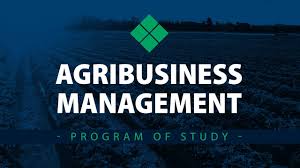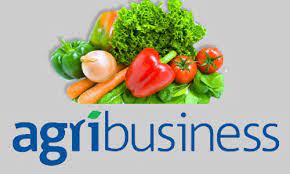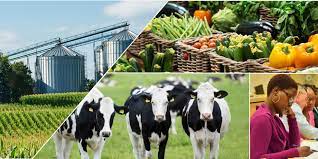Do you know that the success on your Agribusiness Venture depends Greatly on Management?
Do you want to learn more about Agribusiness Management?
Do you want to Up your Agribusiness Management Skill-sets, Knowledge and Capacity?
If the answer to any of these questions is "Yes", you are on the right page
READ ON!!!
The success of any human endeavor depends greatly on the quality of decision making associated with the nature of complex process surrounding the activity. Thus, individuals are always confronted with sensitive and non-sensitive decisions making on human and material resources towards achieving its overall interests or goals. Therefore, the efforts of ensuring that instructional objectives are set up, executed and evaluated describe what is called management process. Different definitions and explanations of management abound, the management of agribusiness could be defined as the active process of decision making to ensure planned and controlled use of available human and material resources to achieve the profit motive of the practitioners. For instance, the decision on how to produce, what to produce, where to produce, quantity of input to employ in production, whether these inputs should be owned or rented and the level of output to produce are decisions that affect the agribusiness profit. A key to successful management of agribusiness is accepting responsibility for leadership and making business decisions through the skillful application of management principles. Management of agribusiness is extremely seasonal, it is products are perishable commodities and it goals in local commodities where long term interpersonal relationships coexist. The art of management has several elements, which include:
- Stating the goals or objectives
- Deciding on how to achieve the objective and the general procedure included planning and testing of plan.
- Evaluation of the plan: organizing, supervising and control.
differences must be identified. To ensure harmony and effective managements of any agribusiness, top managers should be able to meet to review their achievement against the set objectives. This will in away minimize chances of failure. A manager can be defined as that person who provides the agribusiness with leadership and who must be a change agent. A good manager must therefore possess the following characteristics:
- Should be a goal oriented individual
- Should have analytical ability
- Should not be afraid of taking risk
- Must have a good initiative
- Must be highly intelligent and with enough to turn joke into naira and kobo
- Have ability to coordinate and motivate others for a greater productivity.
- Should be technically competent.
- Be one with an enquiring mind.
- Should be flexible, that is, know that today’s decision may be wrong tomorrow.
- Should be ready to learn even from his subordinates.
Functions of Agribusiness Management
Management of agribusiness as have a series of functions to perform. These functions include planning, organizing, directing, coordination and control.
- Planning Function: this involves the establishment of the organizational goals and the strategies for accomplishing them. The planning function in agribusiness contains a number of steps. These steps include the identification and definition of a problem, acquiring initial information, identifying alternative courses of action and analyzing each alternative. It is the most basic management function as it means deciding on a course of action, procedure and policy. Nothing can happen in any agribusiness set-up until a course of action is selected.
- Organizing Function: Organizing is an operational function of the agribusiness management, which depends heavily on the co-ordination of the entire system. Organizing function involves arranging people and other resources together in the most effective way. This include:
- Setting up the structure
- Determining the job to be done.
- Selecting, allocating and training of personnel
- Establishing relationship with the business set-up and staffing them.
Organizing remains an action step in agribusiness management. Until the employees understand themselves and the agribusiness, cooperation and coordinated action become impossible to achieve.
- Directing Function: It is the responsibility of the agribusiness management to direct resources. Directing implies routing resources to where they are mostly needed to ensure proper implementation of the plan. It involves such actions as assigning duties and responsibilities establishing the result to be achieved, delegating authorities where necessary, creating conducive working environment and carrying out the assigned duties effectively. For a maximum result to be achieved, the agribusiness managers must take the interest of his staff into consideration and the need to re-evaluate every step in the directing function in order to achieve the desired goals.
- Coordinating Function: The coordinating function of agribusiness management involves the pulling together of the actions of different group of people in such a way that the action of one group provides and aid to the working of the other. Coordinating function can be effective only if conducive working environment is provided for success. It provides for free flow of information and the growth and development of the workers.
- Controlling Function: Controlling in management describes an information system that monitors plans and process to ensure that they are meeting the established goals. A warning note is necessary to effect any remedial action. Prices and other changes, which occur after the plan had been implemented, can cause the result to deviate from the expected. Controlling function therefore monitors and makes adjustment for the managers to stay on business.
Environmental Factors Affecting Managerial Functions
The management process of agribusiness is seriously affected by number of environmental factors which include:
- Formal Education: Formal education of the manager is an essential aid to effective management in any agribusiness enterprise. The more educated the manager is, the better his managerial ability. The person becomes more perceptive, thinks faster and more able to perform through a tailor made education or with a high formal educational attainment.
- Socio-Cultural Factors: Socio-cultural factor play a significant role in shaping the effectiveness of the managerial process. They represent the most powerful factors and one that the manager has the least control on. For instance, a manager has to mix freely with different groups of people with diverse cultural background. The knowledge, belief, art, morals, customs and habits acquired by the employees as members of a given society affect their productivity.
- Lego-Political Factors: This reflects various salient variables and usually they include such factors as government regulations on duties, labor, laws, salary increases through collective bargaining, fringe benefits, bye-laws and statutes that affect the operation of an organization. Inconsistency in public policies on agribusiness development and political instability in a given economy have important bearing on the functioning of management process of agribusiness organization.
- Economic Variable: The effect of this on management depends on the economics system the country operates. For instance, in a socialist system, the effectiveness of a manager is definitely going to be hampered by unrealistic demands by the central authority. In a free market economy or capitalist economy where prices are not stable, the supply and acquisition of agribusiness inputs will be greatly affected adversely. Under such system other factors as political instability, foreign exchange problems rapid economic expansion, industrial unrest and entrenched government bureaucracies are likely to set in.
Farm Management Decision
The quality of decisions taken on our various farms determines to a large extent the outcome and productivity of our agricultural economy or the agribusiness sector. Efficiency in management can lead to an increase in our agricultural output, which will directly affect our national income self-sufficiency in food production, saving of our foreign exchange earnings and eventually meeting the demands of our Agro-allied industries. Since the goal of the farm management is that of profit making, appropriate and sound management decisions must be made towards allocating limited resources to a number of production alternatives to organize and operate the business in a way to attend this noble objective. There are many decisions that affect the profitability of any farming business. For instance, the decision on what to produce, how to produce, when to produce, whom to produce for, quantity of output to produce, combination of input to employ and how to distribute the output.
The farm manager decides what to produce a list of possible alternatives within his reach. The choice of what to produce depends on the demand of the consumers and the manpower objective. The farmer or manager must, as a matter of choice, produce what is in great demands by the consumers if he must dispose of his output for profit. But if the manager’s objective is to produce for home consumption (subsistence), then he will produce to meet his family taste and preference. It is important to note that the objective for which the farmer produces a product affects the quality of the product. The agribusiness manager must also consider how to produce his particular products. This involves the technology to employ such as mechanization in case of facing high demand; the input to use and in what proportion, over which enterprise are they to be allocated. The type of production method selected determines the total cost of production since
there are different methods and techniques available for producing a particular crop. The farm manager usually uses the method of production that has the least cost. It is the responsibility of the manager to also decide on the level of output to produce. There are many possible levels of output for any particular commodity given the available inputs. It is always advisable for managers to produce us much as he can sell. The manager must always choose the most profitable level of output to produce his given limitations. Decisions taken on our various farms have attendance implications.
Certain characteristics must therefore be observed before taking these decisions, some of which are discussed below:
- Importance: Generally, decisions vary according to their importance which is measured by the potential gains or loses associated with taking such decision. If the size of the potential loss is greater than the potential gain, it is better to wait until more relevant information (data) is obtained before making such decisions. For instance, the decision to crop more farmland may be more importance than decision to fence a farm area.
- Frequency: There are some decisions that vary with respect to the frequency with which they are made. For example, the decision on feeding a broiler is done frequently. This kind of decisions are routine kind¸ which means that a feeding regime or schedule can be developed at the beginning of the feeding period and continues with it until condition of the bird demands for a change.
- Imminence: Imminence by word means the penalty of waiting in order to make decision. Virtually all decisions a farm have expiring time (useful life). After the life of a decision, a penalty will surely be paid if time is wasted in implementing such decision. If the penalty is low, it is better to wait for more information whereas in a high penalty,, it is better to take a decision
- Availability of Alternate: Some situation present a multiple of possible alternatives for decision making while others present only two alternatives. For those that present multiple choices, the farm manager must be careful to delete a number of alternatives based on certain criteria and make decisions only on those alternatives that are relevant to impending circumstance.
- Revocability: Decision made and revolved have attendance cost. If the cost of changing the decision will be enormous the farmer may not change the decision. For instance, if you decide to go into cocoa production, the cost of destroying the trees is far higher than the decision to grow yam.
DO YOU WANT TO GAIN INDEPTH KNOWLEGDE ABOUT AGRIBUSINESS MANAGEMENT, ENROL AT MEASUREIT247 AGRIBUSINESS SCHOOL,
FOR FURTHER HELP AND GUIDANCE ABOUT AGRIBUSINESS MANAGEMENT,
For enquiries, Contact:
Tobi Fatunmbi
email: tobi.measureit@gmail.com
mobile number: +2348163554014
Enjoyed this post? Never miss out on future posts by following us
JOIN MEASUREIT247 COMMUNITY ON FACEBOOK click here
LIKE MEASUREIT247 FACEBOOK PAGE click here
JOIN MEASUREIT247 COMMUNITY ON TELEGRAM click here






No comments:
Post a Comment
Post comments here...
To advertise on our Marketplace; include the following details:
Name of product or service:
Description:
Price:
Contact details (Phone number):
Location:
For Enhanced Commenting Engagements
Check our Comment Guide here